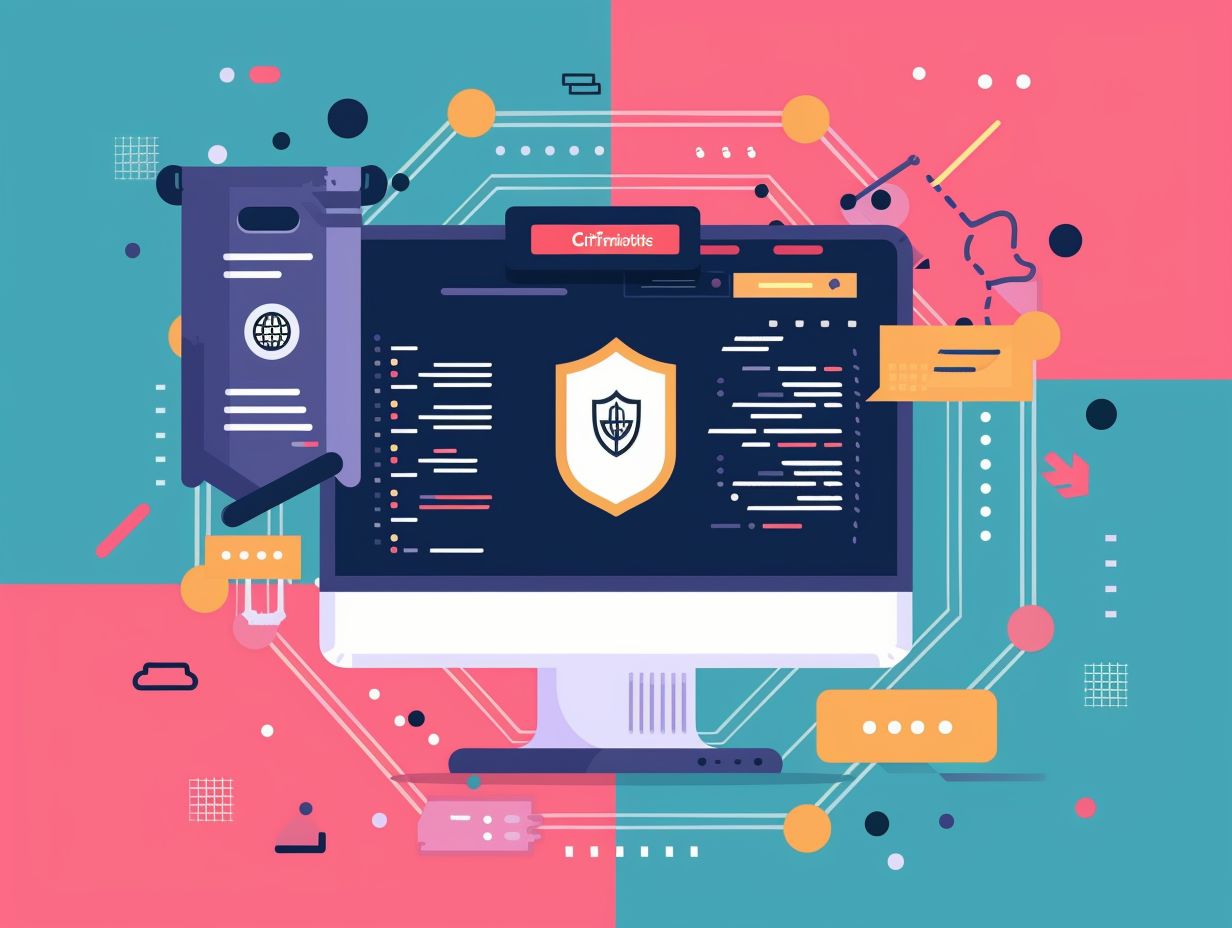If you are looking to enhance your programming skills and advance your career in the field of cybersecurity, consider becoming a Certified Secure Programmer .NET (ECSP .NET).
In this program, we will explore the benefits of obtaining this certification, the exam format and preparation tips, key concepts and topics covered, as well as how to maintain your certification through continuing education. Join us as we delve into the world of secure coding principles and practices, and discover the opportunities for growth that come with being a Certified Secure Programmer .NET.
Key Takeaways:

What is ECSP .NET?
The ECSP .NET certification, short for EC-Council Certified Secure Programmer .NET, targets individuals engaged in application development using the .NET framework. This program is designed to educate on secure coding principles and best practices for developing secure applications.
When you achieve ECSP .NET certification, you develop expertise in recognizing common security vulnerabilities and implementing strategies to mitigate risks in your applications. This certification is instrumental in bolstering the overall security stance of software solutions constructed on the .NET framework, ultimately reducing the susceptibility to cyber attacks and data breaches.
The primary objectives of the ECSP .NET program include give the power toing developers with the knowledge and competencies to proactively address security issues throughout the development lifecycle, ensuring security is a focal point from the outset of coding. This certification underscores the significance of adhering to established secure coding standards in the industry, enabling professionals to produce durable and resilient applications that can confront potential threats.
By upholding secure coding practices advocated through the ECSP .NET certification, developers contribute to cultivating a more secure digital environment and play a role in safeguarding sensitive data and information. Attaining ECSP .NET certification not only confirms an individual’s adeptness in secure programming practices but also showcases their dedication to fostering a secure and robust software development landscape.
Benefits of Becoming a Certified Secure Programmer
Obtaining a Certified Secure Programmer designation provides you with a variety of advantages, such as improved career progression prospects and proficiency in secure coding methodologies. The ECSP .NET certification ensures that you possess the essential knowledge and skills to handle cybersecurity issues and execute risk management tactics efficiently.
Career Advancement and Skill Development
Obtaining the ECSP .NET certification can significantly enhance career advancement for information assurance professionals. It demonstrates a high level of skill development in secure coding principles and an in-depth understanding of cybersecurity incidents and risk management.
This certification not only validates your expertise in secure programming but also opens doors to a plethora of opportunities in the cybersecurity realm. Professionals who hold the ECSP .NET certification are often sought after for their ability to design, develop, and maintain secure applications, which are crucial in safeguarding sensitive data and preventing cyber threats.
The specialized knowledge gained through this certification can lead to job roles with increased responsibilities and higher salaries, as businesses prioritize hiring individuals with proven skills in information assurance and secure software development.
Exam Format and Preparation

To effectively prepare for the ECSP .NET exam, it is crucial for you to have a solid grasp of the exam format. Proper utilization of suitable study resources and practice materials is essential to ensure your readiness for the certification exam. Familiarizing yourself with the types of questions and topics covered will be key to achieving success in the ECSP .NET certification.
Types of Questions and Study Resources
In the ECSP .NET certification exam, you will encounter various question types, including multiple-choice, scenario-based, and practical coding questions. To prepare effectively for the exam, it is recommended that you make use of study resources that address secure coding practices, secure code review, and cryptography.
Understanding the different question formats that you will face in the ECSP .NET exam is essential for achieving success. Multiple-choice questions are designed to assess your theoretical knowledge, while scenario-based questions evaluate your practical application skills. Practical coding questions will test your ability to write secure code. To perform well across these diverse question types, you should concentrate on mastering secure coding principles, cryptography fundamentals, and secure code review techniques. Utilizing study materials that offer thorough coverage of these subjects can significantly enhance your preparation and improve your chances of passing the exam successfully.
Key Concepts and Topics Covered
The ECSP .NET certification encompasses fundamental concepts and subjects pertaining to secure programming, such as authentication, authorization, cryptography, and secure session management within the .NET framework. A comprehensive grasp of these pivotal areas is essential for the development of secure and robust applications.
Secure Coding Principles and Practices
Ensuring adherence to secure coding principles and practices is a critical component of the ECSP .NET certification. One must have a comprehensive understanding of error handling, secure file management, and best practices in secure programming to effectively mitigate cybersecurity risks and vulnerabilities during application development.
By consistently implementing these principles and practices, developers can significantly decrease the chances of introducing exploitable vulnerabilities into their software.
Error handling methods, such as rigorous input validation and effective exception handling, play a vital role in proactively preventing security breaches and data disclosures.
Implementing secure file management protocols guarantees the safe storage and restricted access of sensitive data, providing protection against potential data breaches.
Adhering to secure programming standards, including the principle of least privilege and regular updates of dependencies, enhances the overall security stance of an application.
Common Security Vulnerabilities and Mitigation Strategies

In the ECSP .NET certification, you are required to focus on identifying common security vulnerabilities and implementing effective mitigation strategies. Key topics such as configuration management and auditing are crucial in minimizing cybersecurity risks and ensuring application integrity.
Configuration management involves maintaining a secure baseline for software components to ensure that only authorized changes are made. Auditing, on the other hand, focuses on monitoring and analyzing system activities to detect potential security breaches. It is essential to take proactive measures such as regular security assessments and penetration testing to identify vulnerabilities before they can be exploited by malicious actors.
By integrating these practices into software development processes, organizations can strengthen their security posture and protect valuable data from cyber threats.
Maintaining Certification and Continuing Education
To maintain your ECSP .NET certification, it is essential to meet renewal requirements and actively participate in continuous education. By staying updated on evolving cybersecurity intelligence and industry trends, you are better equipped to address the dynamic nature of cyber threats. Information assurance professionals find value in continuous learning and skill enhancement for effective cybersecurity practices.
Renewal Requirements and Opportunities for Growth
Renewing your ECSP .NET certification involves meeting specific requirements related to skill updates, risk management practices, and forensic investigation knowledge. This process offers opportunities for professional growth and specialization in cybersecurity domains.
If you are seeking to renew your ECSP .NET certification, the process requires you to enhance your existing skill sets to align with the latest cybersecurity trends and technologies. It underscores the importance of staying updated on emerging threats and vulnerabilities while honing your risk management proficiency to protect organizations from cyber risks. Developing expertise in forensic investigation capabilities is crucial for identifying and managing cyber incidents effectively.
By renewing your certification, you can unlock doors to advanced career opportunities in the ever-evolving field of cybersecurity. This will enable you to make significant contributions to safeguarding digital assets and infrastructure.
Frequently Asked Questions
What is the Certified Secure Programmer .NET (ECSP .NET) certification?

The Certified Secure Programmer .NET (ECSP .NET) certification is a credential that validates an individual’s expertise in secure programming using the .NET framework. It covers secure coding practices, vulnerability assessment, and mitigation techniques.
Why should I get certified as a Secure Programmer .NET (ECSP .NET)?
Having the Certified Secure Programmer .NET (ECSP .NET) certification showcases your proficiency in developing secure applications using the .NET framework. It can boost your career, increase your earning potential, and enhance your credibility as a secure programmer.
What are the prerequisites for taking the Certified Secure Programmer .NET (ECSP .NET) exam?
To take the Certified Secure Programmer .NET (ECSP .NET) exam, you must have a fundamental understanding of .NET programming and secure coding principles. It is recommended to have at least two years of experience in software development.
What topics are covered in the Certified Secure Programmer .NET (ECSP .NET) exam?
The Certified Secure Programmer .NET (ECSP .NET) exam covers topics such as secure coding practices, .NET security architecture, input validation and output encoding, error handling, cryptography, and web application security.
How can I prepare for the Certified Secure Programmer .NET (ECSP .NET) exam?
You can prepare for the Certified Secure Programmer .NET (ECSP .NET) exam by attending a training course, studying the official courseware, and practicing with sample exam questions. You can also gain hands-on experience through secure programming projects and by familiarizing yourself with .NET security tools and resources.
Is the Certified Secure Programmer .NET (ECSP .NET) certification recognized globally?
Yes, the Certified Secure Programmer .NET (ECSP .NET) certification is recognized globally as a reputable credential for secure programmers. It is accredited by the International Council of E-Commerce Consultants (EC-Council) and can be verified through their online portal.
